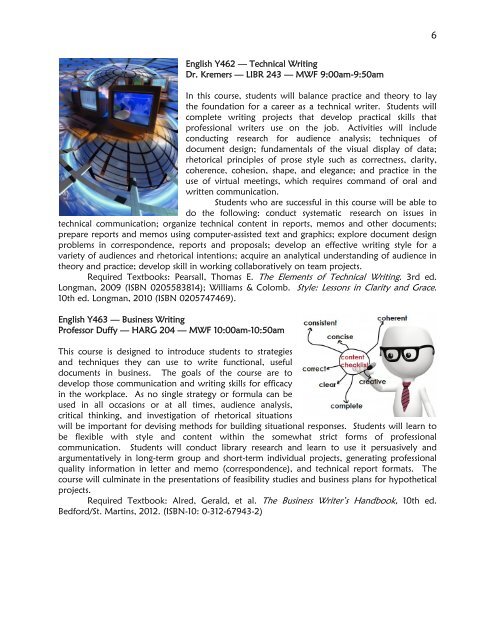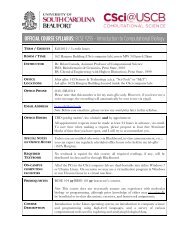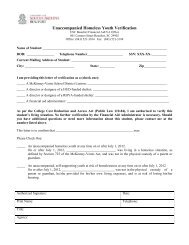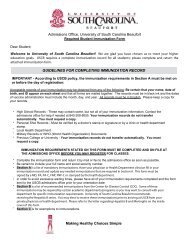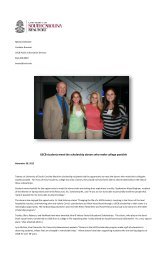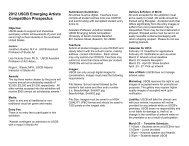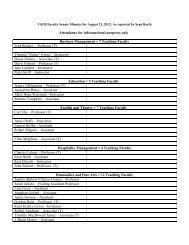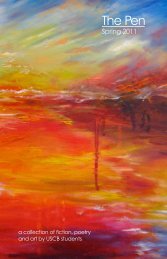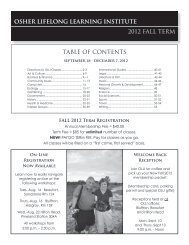SPRING 2013 ENGLISH COURSES
SPRING 2013 ENGLISH COURSES
SPRING 2013 ENGLISH COURSES
You also want an ePaper? Increase the reach of your titles
YUMPU automatically turns print PDFs into web optimized ePapers that Google loves.
English Y462 — Technical Writing<br />
Dr. Kremers — LIBR 243 — MWF 9:00am‐9:50am<br />
In this course, students will balance practice and theory to lay<br />
the foundation for a career as a technical writer. Students will<br />
complete writing projects that develop practical skills that<br />
professional writers use on the job. Activities will include<br />
conducting research for audience analysis; techniques of<br />
document design; fundamentals of the visual display of data;<br />
rhetorical principles of prose style such as correctness, clarity,<br />
coherence, cohesion, shape, and elegance; and practice in the<br />
use of virtual meetings, which requires command of oral and<br />
written communication.<br />
Students who are successful in this course will be able to<br />
do the following: conduct systematic research on issues in<br />
technical communication; organize technical content in reports, memos and other documents;<br />
prepare reports and memos using computer-assisted text and graphics; explore document design<br />
problems in correspondence, reports and proposals; develop an effective writing style for a<br />
variety of audiences and rhetorical intentions; acquire an analytical understanding of audience in<br />
theory and practice; develop skill in working collaboratively on team projects.<br />
Required Textbooks: Pearsall, Thomas E. The Elements of Technical Writing. 3rd ed.<br />
Longman, 2009 (ISBN 0205583814); Williams & Colomb. Style: Lessons in Clarity and Grace.<br />
10th ed. Longman, 2010 (ISBN 0205747469).<br />
English Y463 — Business Writing<br />
Professor Duffy — HARG 204 — MWF 10:00am‐10:50am<br />
This course is designed to introduce students to strategies<br />
and techniques they can use to write functional, useful<br />
documents in business. The goals of the course are to<br />
develop those communication and writing skills for efficacy<br />
in the workplace. As no single strategy or formula can be<br />
used in all occasions or at all times, audience analysis,<br />
critical thinking, and investigation of rhetorical situations<br />
will be important for devising methods for building situational responses. Students will learn to<br />
be flexible with style and content within the somewhat strict forms of professional<br />
communication. Students will conduct library research and learn to use it persuasively and<br />
argumentatively in long-term group and short-term individual projects, generating professional<br />
quality information in letter and memo (correspondence), and technical report formats. The<br />
course will culminate in the presentations of feasibility studies and business plans for hypothetical<br />
projects.<br />
Required Textbook: Alred, Gerald, et al. The Business Writer’s Handbook, 10th ed.<br />
Bedford/St. Martins, 2012. (ISBN-10: 0-312-67943-2)<br />
6


